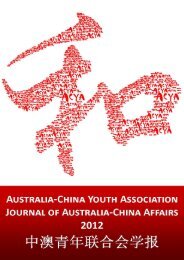a-chinese-stretch-of-the-imagination
a-chinese-stretch-of-the-imagination
a-chinese-stretch-of-the-imagination
Create successful ePaper yourself
Turn your PDF publications into a flip-book with our unique Google optimized e-Paper software.
and influential institutions in <strong>the</strong>se countries. But China is spe-<br />
cial because <strong>of</strong> <strong>the</strong> huge importance it has assumed in our bilat-<br />
eral relations, in our region and in global equations <strong>of</strong> influence<br />
and power.<br />
Before Whitlam went to China in 1971, Australia’s China policy<br />
had become in many respects a function <strong>of</strong> US China policy. Australia’s<br />
China policy today is again becoming a function <strong>of</strong> US<br />
policy, in that Australia has made itself a military accessory to<br />
Washington’s re-invigorated alliance system in <strong>the</strong> Pacific, which<br />
is about buttressing Washington’s position vis-à-vis Beijing, providing<br />
support for its rivalry and contest with Beijing in Asia and<br />
<strong>the</strong> Pacific, and collateral for a policy for containment <strong>of</strong> China.<br />
The government denies it’s directed against China but <strong>the</strong> way it’s<br />
discussed in <strong>the</strong> US belies <strong>the</strong> denial, and <strong>the</strong> government’s commitment<br />
to this military/ strategic direction in US foreign policy<br />
contradicts <strong>the</strong> contention in its own White Paper that ‘this is not<br />
a world in which anything like a containment policy can work<br />
or be in our national interests’. 4 And on <strong>the</strong> matter <strong>of</strong> signing up<br />
to this US policy, between government and opposition <strong>the</strong>re’s a<br />
weird unspoken complicity <strong>of</strong> competitive bipartisanship.<br />
That’s where we’ve come back to, after forty years.<br />
Let me make one thing clear. The point I am making is not about<br />
choice between China and America, which is how it has <strong>of</strong>ten<br />
been characterised, trivialised and deflected by <strong>the</strong> government<br />
to suggest that its critics only think in such absurdities. The point<br />
is about <strong>the</strong> nature <strong>of</strong> our relations. With China, and with <strong>the</strong> US.<br />
And <strong>the</strong> problem is, <strong>the</strong> object <strong>of</strong> <strong>the</strong> policy <strong>of</strong> containment is now<br />
a country with which we have an overwhelmingly important relationship,<br />
second only to that which we have with <strong>the</strong> US, and<br />
an array <strong>of</strong> intersecting and common interests, not to mention<br />
that it’s our major trading partner and recent economic lifeline,<br />
a country with which it is in our national interests to have extremely<br />
good political relations and an effective voice. And <strong>the</strong><br />
government adopted its new military tilt to <strong>the</strong> United States without<br />
<strong>of</strong>fering <strong>the</strong> Australian people any strategic view on where<br />
it thinks this means we are heading politically and strategically<br />
with China in <strong>the</strong> longer term. Government has vacated <strong>the</strong> leadership<br />
<strong>of</strong> ideas on China, and <strong>the</strong> Opposition does not fill <strong>the</strong> void.<br />
From <strong>the</strong> 1960s, debate about <strong>the</strong> Australian response to Asia was<br />
fuelled by ideas from <strong>the</strong> very top. Whitlam on China, for example,<br />
Fraser on fleeing Vietnamese and non-European refugees, Hawke<br />
on enmeshment, Hawke and Keating both on institutional region-<br />
响的机构建立联系方面,我们没有进行足够的投入。但是和我刚才所提<br />
到的其它国家相比,中国又是比较特别的,因为我们同中国的关系对我<br />
们在我们所在的地区乃至全世界的影响力和实力上极为重要。<br />
在惠特拉姆1971年访华之前,在众多方面澳大利亚的中国政策附属于美<br />
国与中国的关系。今天,澳大利亚的中国政策又正在回到老路,澳大利<br />
亚俨然成为美国重返亚洲战略的同盟系统中的附属物。澳大利亚的这个<br />
立场加强了美国在对华博弈上的优势,为其对抗性政策提供了支持,是<br />
在亚太地区抗衡北京制约中国政策的一个筹码。澳大利亚政府否认这些<br />
行为出自针对中国的目的,但是来自美国的信息却恰恰相反。澳大利亚<br />
政府对美国的军事和战略投入,与白皮书上所说的‘当今世界,遏制政<br />
策早已不起作用,而且也不符合我们的国家利益 4 ’全然矛盾,而且就是<br />
否追随美国遏制政策的问题,政府与反对党间具有心照不宣的默契。<br />
这就是我们花费了整整40年所收获和达至的回归。<br />
让我进一步阐明我的观点。我并不是试图证明澳大利亚应该在中国和美<br />
国之间做出抉择,这恰恰是政府经常为它的批评者塑造的可笑形象,将<br />
他们简单化为只会在两者之间做选择的傻瓜。我在这里所要讨论的是关<br />
于澳大利亚与中国、美国的关系的本质。<br />
当遏制政策的目标是已经同我们建立了在重要性上仅次于我们同美国关<br />
系的国家,而这个国家又是我们的主要贸易伙伴和近期经济的生命线,<br />
与其构建良好关系和享有有份量的声音对我们的国家利益至关重要的时<br />
候,我们所面临的利益选择盘根错节,异常复杂。然而,政府在军事上<br />
向美国倾斜的同时,并没有给澳大利亚人民指出战略远景,并没有让他<br />
们知道这样的决策会对我们同中国的长期关系产生何种影响。政府就这<br />
样在观念领导力上制造出了真空,而反对党也没有来填补这个空缺。<br />
自从上世纪60年代开始,高层的观点,例如惠特拉姆关于中国,弗雷泽<br />
关于越南和其它非欧洲难民,霍克对于纳入政策的看法以及霍克和基廷<br />
8 9



